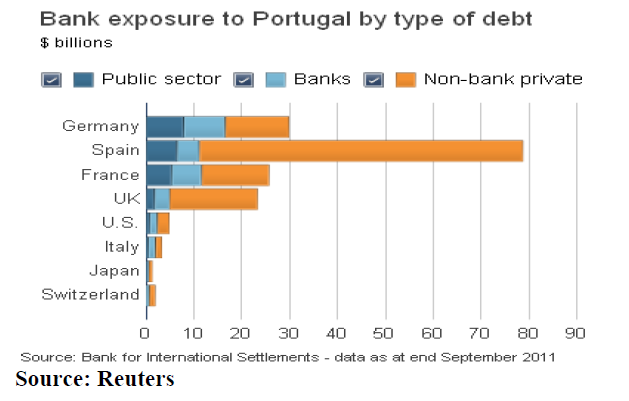
- All Instrument Types
- Indices
- Equities
- ETFs
- Funds
- Commodities
- Currencies
- Crypto
- Bonds
- Certificates
Please try another search

Which stocks will surge next?
Are The Markets And Politicians Underestimating The Impact Of A Disorderly Greece Default And Eurozone Exit?

For the first time since the beginning of the eurozone debt crisis, there is growing belief among a number of politicians and analysts that Europe would be able to weather the impact of a disorderly Greek default and exit from the eurozone, or, more specifically, that the contagion effect on countries such as Portugal, Spain and Italy would be limited. Taking this position would have been nearly unthinkable not so long ago. This new line of thinking is exemplified by the following public statements made by certain high profile European politicians and business leaders:
“The costs are much less than a year ago. We have bolstered our emergency funds. And we have a budget pact, with additional measures to bring down budget deficits. The risks of contagion have strongly decreased.” (Dutch Finance Minister Jan Kees)
“It’s not the end of the world if someone leaves the eurozone.” (European Commission Vice-President Neelie Kroes)
“It might be something which would allow Greece to get a new start … to create an economy that can create jobs.” (Luxembourg Finance Minister Luc Frieden)2 The risk from Greece leaving the eurozone has “lost much of its horror.” (German Economy Minister Philipp Roesler)
Greece would have better chances of economic recovery if it left the eurozone. (German Interior Minister Hans-Peter Friedrich)
Franz Fehrenbach, chief executive of industrial company Bosch, Klaus-Peter Mueller, chairman of Commerzbank AG, and Wolfgang Reitzle, CEO of industrial gases producer Linde AG, are but three examples of German business leaders that have publicly come out in favour of Greece exiting the eurozone.
Even Wolfgang Schauble, the foreign minister of Germany, arguably the country’s second most powerful politician after Chancellor Merkel, is now in favour of letting Greece default and exit the eurozone.6 For now at least, the markets appear to share these optimistic views. Unlike 2011 when every new turn in the eurozone debt crisis sent markets into a panic, this year the markets appear to have become increasingly complacent to events in the eurozone. For example, they barely reacted to the riots in Greece or the difficultly the European Union (EU) had in agreeing to the conditions for the latest Greek bailout package. There are indeed more reasons to be confident about the eurozone debt crisis than before:
The European Central Bank (ECB) has provided the banks with ultra-cheap financing, thus heading off a potential bank crisis.
Foreign bank exposure to Greece has dropped significantly and sovereign debt yields have markedly declined in Spain and Italy.
Some also feel the markets have regained their sanity in not according Greece, which accounts for less than 2% of the EU’s GDP, too much importance.
Despite these positive factors, we still continue to believe that the markets are underestimating the economic and geopolitical implications of a disorderly Greek default and eurozone exit. In chronicle order, they include:
1. Holders of Greek debt would be forced to take an 80%-90% haircut.
2. Creditor countries would be compelled to honour the guarantees they made on the bailout fund and recapitalize the ECB. This is after having long assured their citizens this scenario would never occur, adding momentum to the growing backlash against the EU’s governing parties and political elites.
3. European banks would be exposed to even higher levels of public and private sector losses. In addition to having bailed out heavily indebted countries, they would be forced to bail out politically unpopular bankers as well.
4. The markets would immediately move on to the next weakest link in the chain: Portugal. Investors, fearing a default, would start dumping Portuguese debt on a large scale.
5. The capital controls implemented by Greece following its bankruptcy and eurozone exit would be taken as a stark warning by the Portuguese and others to withdraw their cash from their banks while they still could (a replay of what happened in Greece). This panic would be reinforced by the sight of cars and boats beings searched at Greek ports and borders in an effort to prevent Greeks from sneaking euros out of the country.
6. In an effort to limit the contagion, the EU would be forced to put together a second bailout package for Portugal.
7. The bailout fund and/or the ECB would have to purchase significant amounts of Spanish and Italian bonds to prevent their yields from spiking. Given its heavy exposure to Portugal, Spain would be particularly impacted.

8. The collapse of Greece, the economic downturn in the EU and domestic public pressure would cause Irish and Portuguese governments to increase pressure for partial loan forgiveness. This would fly in the face of pledges made by Germany, France and other countries that the partial debt reduction given to Greece was a one-off event.
9. A bankrupt Greece would still require significant financial assistance because the drachma would not immediately be accepted as a form of payment by other countries. Greece would thus need assistance from the EU/IMF to pay for imports of food, medicine and energy, as well as recapitalize its banking system. Having their tax dollars still being sent to Greece even after it has defaulted would further anger the citizens of creditor countries.
10. The demand for more funds to calm the markets would coincide with record levels of opposition by the citizens of creditor countries to further bailouts. Opposition to bailouts would rise from over 60% in countries such as Germany and Netherlands to over 80% after the collapse of Greece. After all the time and money spent in the futile attempt to save Greece, there would be very little public support to begin the process all over again with Portugal and other countries.
11. Support for formerly marginal anti-EU parties on the extreme left and right would surge, causing coalition governments to collapse in Finland and the Netherlands.
12. The Greek collapse and worsening of the European economic environment would cause Italy, Spain and even France to openly challenge the wisdom of the German-driven austerity approach. They would likely forge a coalition to pressure Germany to ease up its policy of aid in exchange for harsh austerity measures. This would make it all the more difficult for EU countries to find common ground.
Conclusion
To summarize, the demands for even more funds to contain the impact of a Greek bankruptcy and eurozone exit would run into an unprecedented level of political opposition that would strain and, in some cases, lead to the collapse of governing coalitions. The divisions between the major EU countries would also widen, seriously impeding the EU’s ability to effectively deal with the crisis. The political climate would be even further poisoned by the economic downturn the European Union finds itself in, a situation many Europeans blame Germany for worsening by its push for the implementation of harsh austerity measures.
The dilemma facing Germany is particularly difficult. Chancellor Merkel’s government approved the latest bailout in the face of severe public opposition (62% of Germans, in a recent poll, opposed this measure). Germany’s constitutional court, meanwhile, warned that any rescue fund exceeding Germany’s national budget – estimated to be 306 billion euros for 2012 – could threaten economic stability and violate Germany’s constitution. Germany is currently on the hook for 211 billion euros of the bailout fund (a figure it promised not to go beyond). If Germany agreed to finance further bailouts in the event of Greek collapse, there is a risk that Germany’s liability would surpass 306 billion euros. This would not only have legal ramifications, but it would also ignite a massive political backlash.7 A similar political backlash would occur in other countries such as the Netherlands, Finland and Austria.
The following picture is a recent front page headline from Bild, Germany’s largest newspaper, urging politicians to vote against a second bailout package for Greece worth about 130 billion euros (which did get approved). This headline is reflective of the growing public opposition in Germany to further bailouts. One can only imagine what this headline would be saying if Germany was asked to provide even more funds to help stabilize the eurozone following a Greek collapse.
Related Articles

In Q1 2024, the US crossed the historic milestone of paying over $1 trillion on interest payments. As a consequence of an unprecedented $5 trillion money supply boost since 2020,...

Yen falls to fresh multi-decade lows after BoJ rate decisionUS GDP flashes mixed signals, dollar retreats in aftermathStocks recover on solid tech earnings, gold resumes uptrend...

Gold Consolidates Just Below 2,340 Ahead of the Critical US PCE ReportThe gold (XAU) price gained 0.69% on Thursday as the US Dollar Index (DXY) dropped following the release...
Are you sure you want to block %USER_NAME%?
By doing so, you and %USER_NAME% will not be able to see any of each other's Investing.com's posts.
%USER_NAME% was successfully added to your Block List
Since you’ve just unblocked this person, you must wait 48 hours before renewing the block.
I feel that this comment is:
Thank You!
Your report has been sent to our moderators for review




Add a Comment
We encourage you to use comments to engage with other users, share your perspective and ask questions of authors and each other. However, in order to maintain the high level of discourse we’ve all come to value and expect, please keep the following criteria in mind:
Enrich the conversation, don’t trash it.
Stay focused and on track. Only post material that’s relevant to the topic being discussed.
Be respectful. Even negative opinions can be framed positively and diplomatically. Avoid profanity, slander or personal attacks directed at an author or another user. Racism, sexism and other forms of discrimination will not be tolerated.
Perpetrators of spam or abuse will be deleted from the site and prohibited from future registration at Investing.com’s discretion.